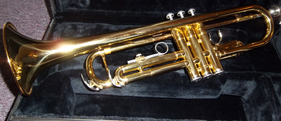 One of the most important things you need to address when considering music lessons is getting an instrument in your hands or the hands of your child. For the beginning student, the cost of the instrument is less important than the quality of the instrument. As students mature musically, they become aware of the craftsmanship of their instrument and may eventually outgrow the one they have been using. This will inevitably lead to the student looking to purchase or obtain a new instrument that meets their needs. However, cost can be a major obstacle for many people, which often pushes them into a mindset of "what can I afford?" rather than "what is best for me (or my child)?" When possible, it is always best to ask for recommendations from professional music teachers prior to making a purchase or renting an instrument. Sadly, this isn't always an option. So what do you do? My opinion is that before you purchase or rent an instrument, you know without a doubt that you need to acquire one. The instrument you have collecting dust in the attic might be just fine for beginner lessons. Do you know someone who has an instrument you can borrow for a few weeks while you decide if taking lessons is what you really want? Ask them if you can borrow it, or if they know someone who has one that might let you play it for awhile. This really is the first step - determining the need to acquire the instrument. Music stores that also give lessons will oftentimes direct you to purchase or rent one of their instruments, even if the instrument isn't a good fit for you. This is because they rely on sales as well as lesson revenue. Be sure you trust the person you speak with at the store before you make your decision at these places. Many stores can give you very helpful information that will help you decide what's right for you, especially smaller local stores with a good reputation. If you have already addressed this question seriously, the next step is to determine whether to rent or buy. You may not have the luxury of being able to rent in your area, but even if there are no music stores near you, there are always online dealers you can order from. Personally, I recommend trying out an instrument BEFORE you buy it, for many reasons, but if this is the only option for you then I suggest doing your research and read reviews on the instruments you're interested in. Purchasing an instrument up front is the right decision for some people. If you know you're going to play for a long time, or you feel you can get a better deal by doing so, then buying an instrument might be the best way to go. If you own the instrument, you can always sell it later on if you no longer play it. You won't have to worry about monthly payments. You won't have to report damages like scratches and dents that happen from time to time. The best part is that YOU OWN IT, and the instrument is completely yours - you can do with it as you please. However, owning an instrument means that if something happens to the instrument to cause it to become damaged and need repaired, you will have to take care of that yourself (take it to a shop, or do the repairs on your own). Unless you carry insurance on your instrument - and most people don't - you will have to front the cash to get the instrument into playable condition again. Renting an instrument is the other option. When you rent an instrument, you often will be asked for a down payment and then you continue to make monthly payments for as long as you own the instrument. Damage can still happen, but your rental agreement or contract should spell out the details of repairs and maintenance. Pay close attention to the contract because you might end up paying for the damages incurred! The best part about renting is that there is a much smaller cost up front. You can walk out the door with a rental instrument in hand and then you continue to benefit from having that instrument as long as you continue to make payments. The best option for renting is a "rent-to-own" program. These programs allow you to make your rental payments as normal, but each time you make a payment, a portion of that payment is applied toward the total cost of the instrument, allowing you to pay it off over time. Once you have paid for the cost of the instrument, you become the new owner of the instrument. There are disadvantages to this option as well. Depending on your rent-to-own agreement, you may end up spending far more than the instrument is worth. You need to determine this first, before you enter into any instrument rental agreement. The second drawback is that by the time you have paid for the instrument, it may be time to purchase or rent another one! This happens frequently with young students who literally outgrow their instrument. Renting an instrument might be better if you are concerned about your child needing a new instrument within a year or two. There is no right or wrong answer here. The right decision is the one that best suits your needs (or your child's needs). You may find that by spending a few dollars on a cheap "toy" guitar from the chain retail store gives you an opportunity to discover that you really aren't as interested as you once thought (also very common with children). Or you may find that you really do want to continue to learn to play the instrument, and then you can move forward into a rental arrangement or purchase an instrument knowing that you've made the right choice. Unfortunately, cheap instruments are pretty terrible instruments to learn on... they're really designed as toys rather than instruments. But once you've made your informed decision, you'll feel more at ease parting with the rental fee or purchase price later on. Finally, as a note of caution, I suggest spending time with any instrument BEFORE you purchase or rent it. During these moments you may find something needs fixed, or is the wrong size, or simply doesn't suit you. whatever you do, be sure to ASK QUESTIONS when considering your purchase. A little time spent before you buy will help you get the best quality instrument for your money. ♫ Sean
2 Comments
|
Studio BlogDiscussions on topics related to musicianship. Archives
January 2016
Categories
All
|
|
© 2012-2023 Sean Carey Music LLC.
All Rights Reserved. |

 RSS Feed
RSS Feed

